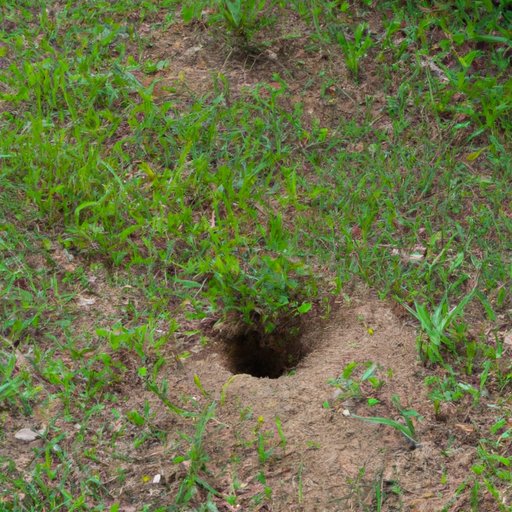What Animal is Digging Holes in My Yard?
It can be frustrating to look out at your once pristine lawn and see holes littered throughout. While some animals, such as birds, naturally dig small holes in search of insects, it’s the larger holes that can cause problems. If you’re wondering what animal is digging holes in your yard, this article will provide insight into the most common culprits and how to prevent them from wreaking havoc.
Understanding the Signs
Before diving into solutions, it’s essential to understand what yard holes look like and their potential impact on your lawn. Large holes, measuring two to three inches in diameter, are often the result of burrowing animals. These holes can cause damage to your landscape and make it difficult to enjoy your yard. Additionally, certain animals, such as moles, can create tunnels and burrows that can interfere with the root systems of grass, resulting in brown patches in your lawn.
Identifying the animal causing the holes is essential to finding the right prevention strategies. If left unchecked, these animals can continue to damage your yard and make it unsightly.
Common Animals and Detection
Several types of animals could be responsible for digging holes in your yard. Moles and voles are the most likely suspects since these burrowing animals create extensive tunnel systems that can damage your lawn. However, raccoons, skunks, and even domestic pets can also cause problems.
The best way to identify which animal is digging in your yard is to look for tracks, measure the size of the holes, and their location. For example, moles typically create a fan-shaped mound in the ground, while skunks often dig holes in search of insects. By identifying these clues, you can narrow down which animal is causing the problem.
Prevention Strategies
One of the best ways to prevent animals from digging in your yard is to install a fence around your property. Make sure to bury the fence 12 to 18 inches deep to discourage burrowing. Additionally, you can deter animals by using natural repellents such as predator urine or planting fragrant herbs like lavender or mint, which will minimize the appeal of your yard.
Reducing food sources can also be an effective preventative measure. Make sure your garbage cans are properly secured and keep pet food indoors. By minimizing available food sources, animals will be less tempted to dig in your yard.
Maintaining a healthy lawn by watering and fertilizing appropriately can also discourage animals from digging since they prefer areas with abundant insects in the soil.
Natural and Humane Solutions
In addition to preventative measures, there are natural and humane ways to deter animals from digging in your yard. Companion planting, for example, involves planting complementary species that can repel insects and discourage certain animals. For example, planting marigolds with tomatoes can repel aphids while deterring rabbits from eating the tomatoes.
Using predator scent is another natural and humane solution. You can purchase predator urine from many garden centers, and the scent will mimic that of a predator and deter animals from digging in your yard. However, keep in mind that this solution will only deter specific animals and may not work for others.
If you find that an animal has nested in your yard, it’s essential to discourage them from returning. Do not fill in the animal’s hole while they’re still present since this can cause harm. Instead, discourage nesting by placing objects such as plants, stones, or mulch in the nesting location.
Identifying and Removing the Animal
If preventative and natural solutions do not work, you may have to identify and remove the animal. Catch and release traps are a humane option for removing animals from your yard. Once caught, the animal can be released back into the wild in a suitable location.
However, it’s essential to note that certain animals, such as skunks, may release an unpleasant odor. In cases like these, it may be best to contact a professional wildlife expert to handle the removal.
Conclusion
In conclusion, finding holes in your yard can be a frustrating and challenging problem to solve. However, by identifying the animal responsible and implementing preventative measures, you can prevent further damage to your lawn. If necessary, natural and humane solutions can be effective in deterring animals, and if these methods fail, professional assistance can help you remove the animal safely and humanely.
Remember, it’s always best to try preventative measures and natural solutions before resorting to removal.
